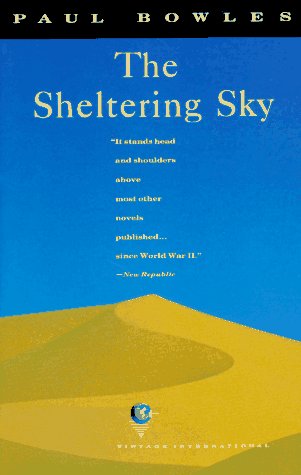robertmac43
Forever 43!
- Mar 31, 2015
- 23,375
- 15,493
Should we set a day for everyone to finish the Sheltering Sky so people do not come on here and see a long spoiler filled discussion?


He can have that kind of meandering effect on me, too. But I always keep coming back for more.Hear the Wind Sing by Haruki Murakami (1979) - Re-read, albeit in English this time instead of French. Strangely enough, I liked re-reading it, albeit for different reasons than I had originally liked it. Perhaps it's the translation, but the story seemed less out-there/whimsical than it did while reading in french and singular dream-like phrases didn't seem as numerous as they had during my first reading. Felt more like a self-deprecating book and an aimless ode to women and friends the author knew/knows. You kind of get the sense that Murakami just wrote what he felt as he went along, without notes or planification and sometimes his ideas/points (if there were any, which it felt like there was) feel a bit self-satisfyingly obscure. I still enjoyed a lot, and it's a very fine and mostly charming read that is easy to read and accessible despite it's oddness, but I feel like I was more satisfied with the french translation.

Death is always on the way, but the fact that you don't know when it will arrive seems to take away form the finiteness of life. It's that terrible precision that we hate so much. But because we don't know, we get to think of life as an inexhaustible well. Yet everything happens only a certain number of times, and a very small number, really. How many more times will you remember a certain afternoon of your childhood, some afternoon that's so deeply a part of your being that you can't even conceive of your life without it? Perhaps four or fie times more. Perhaps not even that . How many more times will you watch the full moon rise? Perhaps twenty. And yet it all seems limitless.
I agree Bowles takes a huge chance killing off Port and sending Kit on what certainly is a leap-of-faith adventure, but that's one of the moves I love in the book, a move that takes the book further away from the norm and the ordinary (say, Tunner rushes to the rescue; Kit demurs on being rescued; eyes stare off into the desert night--that sort of thing). I also think it is a necessary move so as to give the "other," the specifically North African "other," its full due. To me this "Kit" section reads like a demented erotic Harlequin fantasy, with all the excitement of "adventure," basically what Port anyway had been seeking, turned into a delirium nightmare for Kit, one that leads to escape certainly but also to the obliteration of the self. Just my two cents, though.
To me on a basic level the novel is about two American travelers (three counting Tunner) who are in North Africa but are in way, way over their heads. Part of the reason is that they think they understand the culture, but they really don't have a clue. The North Africans they run into along the way see the couple as naive, but the North Africans come across more as relatively bland public officials with a job to do and the presence of Kit and Port just complicates it. I think Bowles wanted a greater contrast between cultures, and that is why Belquassim gets introduced into the equation--as someone who will seem totally on a different wavelength than anything Kit or the reader has experienced or imagined. To me, he and his differences in terms of values, world view and behaviour symbolize how wide the distance is between the culture of the Bedouins and the culture of Kit and Port and how fraught with unexpected peril that leaves vulnerable Kit.What do you mean by this?


